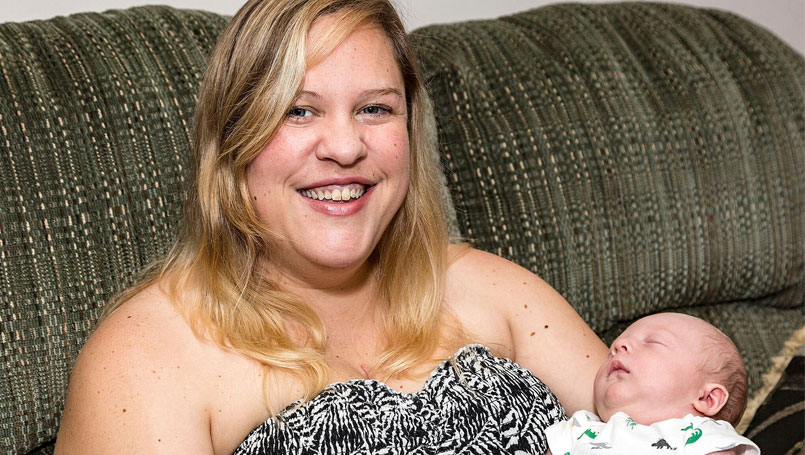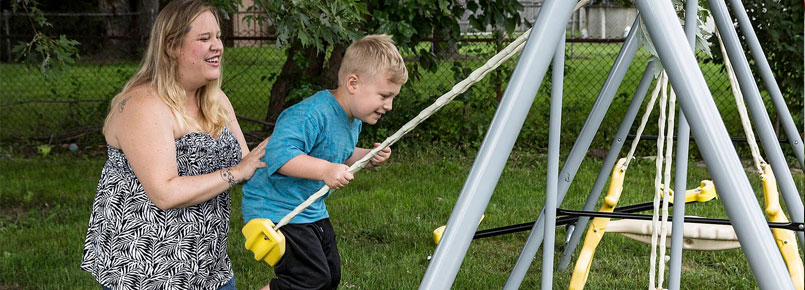Thursday, October 06, 2016

Many pregnant Moms also caring for an active 5-year-old, feel tired and short of breath now and then.
But last April, Tiffany Polisena’s symptoms propelled her to the Emergency Center at Beaumont Hospital, Troy. And with good reason.
Within hours of admission, the now 36-year-old Sterling Heights woman developed congestive heart failure.
Further examination, and a transfer to Beaumont Hospital, Royal Oak, uncovered a shocking diagnosis: aortic valve stenosis, or narrowing of the main heart valve, causing significantly restricted blood flow.
In addition to debilitating valve disease, Polisena, who was 17 weeks pregnant at the time, was found to be at even greater risk: two of the main arteries to her heart were severely blocked.
“We were all struck by the severity of Tiffany’s decreased heart function,” said Michael Gallagher, M.D., Beaumont Hospital, Royal Oak cardiologist.
Beaumont, Royal Oak, cardiac surgeon Francis Shannon, M.D. added, “I’ve been here for 29 years and have never treated a patient like this. Her heart was in such bad shape, she couldn’t walk to the bathroom, she couldn’t breathe.”
Increased blood flow demands to the heart and uterus during pregnancy, Dr. Gallagher explained, significantly weakened Polisena’s heart.
“In terms of heart function, pregnancy is like running a marathon,” Dr. Gallagher said. “And Tiffany’s heart wasn’t able to keep up with the increased demand. We were stuck.”
Without medical intervention, it would be risky - if not impossible - for Polisena to survive and successfully carry her baby to viability - 23 weeks - much less to term, explained obstetrician-gynecologist Samuel T. Bauer, M.D, medical director, Outpatient Perinatal Clinical Services & Perinatal Outreach for Beaumont Health.
Then, a little more than two weeks after admission, Polisena’s condition took a turn for the worse: her heart stopped beating and she went into full cardiac arrest in her hospital bed, while her husband Mike and five-year-old son Cameron watched helplessly.
Thanks to the quick response of two cardiac, intensive care unit nurses and a resident doctor, who performed CPR on her, Polisena survived the crisis and was ushered into the catheterization lab the following day.
At this point, she, her baby and the multidisciplinary team of doctors treating her, faced another uphill battle: due to Polisena’s unique aortic and heart valve anatomy, the minimally invasive procedure to replace her faulty heart valve, known as Transcatheter Aortic Valve Replacement, or TAVR, was not an option.
Instead, the surgical team performed full, open-heart surgery.
This meant that she had to have an eight-inch incision in her chest and be placed on a heart bypass machine to feed blood to her organs and 20-week-old pre-term baby during surgery.
“Pregnant women tolerate cardiopulmonary bypass nearly as well as other women, except when it is emergently needed,” explained Dr. Bauer, who is board-certified in Maternal-Fetal Medicine, a high-risk obstetrics subspecialty. “The risk of fetal death with cardiopulmonary bypass is more than 20%, so this is only performed in urgent situations.”
Dr. Gallagher said, “This was a very unique clinical situation with little medical literature to guide our approach. We worked together as a multidisciplinary team to develop a treatment protocol for Tiffany. This included cardiologists, cardiac surgeons, anesthesiologists, neonatologists, high risk Maternal Fetal Medicine specialists and several nurses. We met regularly to discuss the challenges and complexities of Tiffany’s heart disease and treatment options, sharing information and paying keen focus to every little change and detail. We were prepared for this challenge – few hospitals could provide that kind of care. The Polisenas had our best.”
We were prepared for this challenge – few hospitals could provide that kind of care.
Dr. Gallagher
Which is exactly what they needed.
Both Polisena and her baby survived the surgery with flying colors. Within weeks, she was scaling steps to the second level of her home, laundry basket in hand.
“She had been so sick for so long without even knowing it, this newfound energy was a real boon,” Dr. Gallagher said. “Tiffany is a tough cookie and an amazing patient.”
Dr. Bauer said, “Twenty years ago, the only option would have been to terminate the pregnancy. But advances in technology and maternal and fetal imaging now allow us to take care of these patients.”

On Aug. 19, Baby Dylan was born healthy.
“I think I knew deep down that whatever happened, I would be OK,” said Polisena, whose condition is not believed to be genetic. “But I was really worried about the baby. We are so grateful that everything turned out so well. It was a whirlwind. Now I feel awesome; I’m good to go. And Dylan’s our miracle.”
In addition to her medical recovery, Polisena and husband Mike are also trying to recover from the financial strain of his being unable to work for most of the five months she was hospitalized and on the mend.
Fortunately, aside from life-long medication dependence, Polisena’s prognosis is excellent.
“With daily diligence Tiffany will live to be a grandma,” Dr. Gallagher said.

